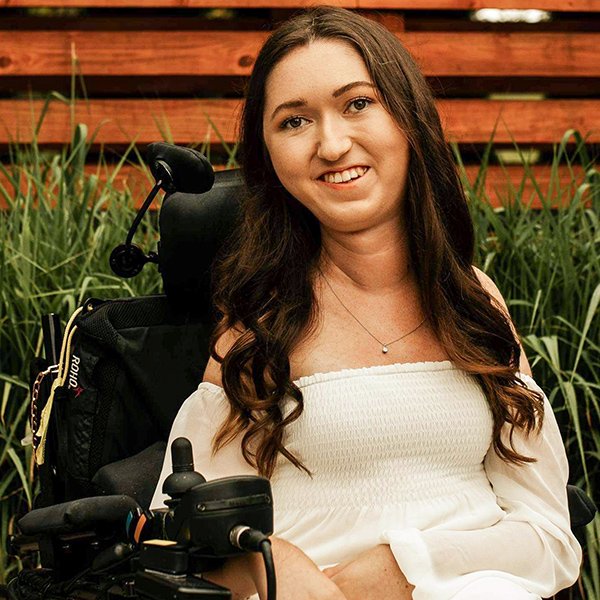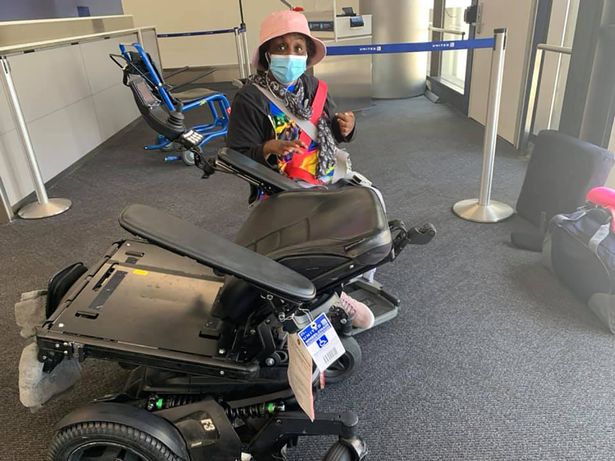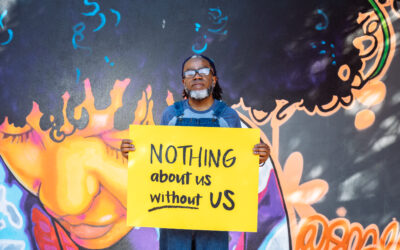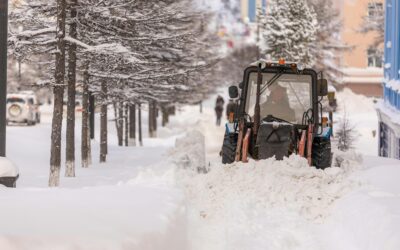Engracia Figueroa’s wheelchair was completely damaged by United airlines on a flight home from Washington, DC where she was speaking at a conference on home healthcare reform.
Photo source: Facebook
If you have been on social media in the past few months, you may be aware of the heartbreaking death of disability activist Engracia Figueroa, who passed away due to complications from injuries she suffered after United Airlines destroyed her wheelchair. She was flying home from Washington, D.C. after advocating to Congress for investments in the United States’ broken home care system.
Upon landing, Figueroa’s $30,000 wheelchair — which was custom-designed to support her spinal cord injury and left leg amputation — was completely broken and unusable. She and her care attendant waited in the airport for over 5 hours trying to resolve the issue, all while her body was in severe pain from sitting in a broken transport wheelchair. Figueroa developed severe pressure sores during this time, and was hospitalized due to acute pain shortly after.
In the months it took for United Airlines to agree to replace Figueroa’s wheelchair, she was forced to sit in a loner chair that was ill-fitted to her body. Hand in Hand (which is the organization that Figueroa was advocating with in Washington, D.C.) said that the loner chair provided by United Airlines ”further exacerbated her pressure sore, and caused muscle spasms, severe edema, and an inability to eat, as well as two additional hospitalizations. The sore became infected and the infection eventually reached her hip bone, requiring emergency surgery to remove the infected bone and tissue.” Unfortunately, complications from the spread of the infection became so severe that Engracia passed away in the morning on Sunday, October 31st, 2021.
Engracia’s story has been shocking and devastating to the disability community, especially considering that reform to air travel for wheelchair users is something that we have been advocating to fix for decades. Our wheelchairs are quite literally our lifeline, yet they are still being treated like worthless and replaceable luggage as we approach the year 2022. Just take a quick browse through Twitter or Instagram and you will see the flood of people who have had their mobility devices demolished beyond repair by nearly every airline in operation. In fact, The Air Travel Consumer Report states that 834 wheelchairs were damaged by US Airlines in July 2021 alone. This works out to airlines damaging or destroying 29 wheelchairs per day, on average.
A few of the countless examples can be seen here:
A girl I know had her power-assist wheels for her wheelchair (that she needs to be independent) broken by Delta. This is an ongoing issue that has happened to countless people in chairs flying with different airlines. You can’t replace something custom made for you in a day. pic.twitter.com/yjYD5QmZ0l
— Beak (@AstridLevinson) May 22, 2021
It's been 72 hours since I live feed my incident at #JFKAIRPORT completely ignored how to handle my chair, even when I specifically advised that my chair does not fold…they folded it anyways causing the chair to completely snap and break. pic.twitter.com/RBOD7gY1bV
— Jillian Mercado (@jilly_peppa) July 18, 2019
Like in Engracia’s case, it is simply not enough to apologize and offer a standard loaner wheelchair as a replacement. Most people with disabilities have highly specialized devices that are customized to fit our unique body shape and stature, meaning we are often bed-ridden and stripped of our independence until that device is returned to us. Engracia said in multiple interviews, “Mobility devices are an extension of our bodies. When they are damaged or destroyed, we become re-disabled. Until the airlines learn how to treat our devices with the care and respect they deserve, flying remains inaccessible.”
But here’s the thing — this would be a completely fixable issue if airlines stopped turning a blind eye to the blatant ableism and discrimination they are causing in the name of profit. Organizations like All Wheels Up have already dedicated the time and funds into proving that locking one’s own wheelchair into an aircraft is completely possible (similar to how wheelchairs are locked into virtually any other mode of transportation like a train or bus). In fact, all tests to date have passed the FAA crash-force standards, but action and funding have been minimal from the airlines themselves.
Tomorrow (December 16, 2021) the Department of Transportation and the US Access Board are hosting a public meeting on aircraft accessibility. We urge everyone in the community to attend and have your voices heard, specifically as it relates to your experience flying as a wheelchair user and how the extreme neglect and mishandling of mobility devices need to be addressed immediately.
Your voice is important. We must not let Engracia Figueroa’s legacy fade.
You can register for the zoom meeting at the following link: https://usdot.zoomgov.com/webinar/register/WN_8PChAZcLQsmDm1xathLEjw

About the Author
Tori Hunter is a writer and travel enthusiast, passionate about redefining the way we view accessibility and the disabled experience. She has worked alongside numerous organizations to help dismantle access barriers, and in her free time, she likes to share her adventures as a wheelchair user on her Instagram @torihunter.blog
Latest on the blog
Milano Cortina 2026: Watching the Shift in Access
The Winter Olympic Games in Milan and Cortina are coming to a close. Records were broken, rivalries were intensified, and fans from all across the world tuned in. Now, attention turns to the Milano Cortina 2026 Paralympic Winter Games, opening March 6, 2026.From...
Black Disabled Leaders Changing Accessibility
Black disabled leaders have shaped powerful social movements across the world and throughout history. For many of them, their lives sit at the intersection of race and disability - two identities that have historically been marginalized. From this intersection comes...
Does Winter Mean House Arrest for Disabled People?
This years snowstorm brought upon excellent opportunities to enjoy fresh and homemade ice-cream, along with the fun of tobogganing with friends and family. There is joy and beauty in watching the snowfall and spending some serious time binge watching romance with new...




